
Kaliningrad Oblast is the westernmost federal subject of the Russian Federation, in Central and Eastern Europe. It is a semi-exclave situated on the Baltic Sea. The oblast is surrounded by two European Union and NATO members: Poland to the south and Lithuania to the north and east. The largest city and administrative centre of the province (oblast) is the city of Kaliningrad, formerly known as Königsberg. The port city of Baltiysk is Russia's only port on the Baltic Sea that remains ice-free in winter. Kaliningrad Oblast had a population of roughly 1 million in the Russian Census of 2021.

Sambia or Samland or Kaliningrad Peninsula is a peninsula in the Kaliningrad Oblast of Russia, on the southeastern shore of the Baltic Sea. The peninsula is bounded by the Curonian Lagoon to the north-east, the Vistula Lagoon in the southwest, the Pregolya River in the south, and the Deyma River in the east. As Sambia is surrounded on all sides by water, it is technically an island. Historically it formed an important part of the historic region of Prussia.

Chernyakhovsk, known prior to 1946 by its German name of Insterburg, is a town in Kaliningrad Oblast, Russia, and the administrative center of Chernyakhovsky District. Located at the confluence of the Instruch and Angrapa rivers, which unite to become the Pregolya river below Chernyakhovsk, the town had a population in 2017 of 36,423.

East Prussia was a province of the Kingdom of Prussia from 1773 to 1829 and again from 1878 ; following World War I it formed part of the Weimar Republic's Free State of Prussia, until 1945. Its capital city was Königsberg. East Prussia was the main part of the region of Prussia along the southeastern Baltic Coast.

Gusev is a town and the administrative center of Gusevsky District of Kaliningrad Oblast, Russia, located at the confluence of the Pissa and Krasnaya Rivers, near the border with Poland and Lithuania, east of Chernyakhovsk. Population: 28,177 (2021 Census); 28,260 (2010 Census); 28,467 (2002 Census); 27,031 (1989 Census).
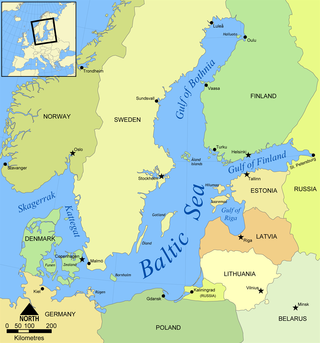
The terms Baltic Sea Region, Baltic Rim countries, and the Baltic Sea countries/states refer to slightly different combinations of countries in the general area surrounding the Baltic Sea, mainly in Northern Europe. The term "Baltic states" refers specifically to one such grouping.
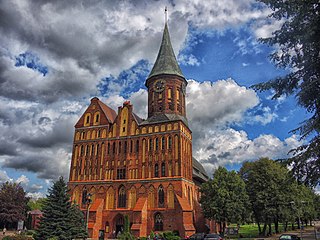
Prussia is a historical region in Central Europe on the south-eastern coast of the Baltic Sea, that ranges from the Vistula delta in the west to the end of the Curonian Spit in the east and extends inland as far as Masuria, divided between Poland, Russia and Lithuania.

Baltiysk is a seaport town and the administrative center of Baltiysky District in Kaliningrad Oblast, Russia, located on the northern part of the Vistula Spit, on the shore of the Strait of Baltiysk separating the Vistula Lagoon from Gdańsk Bay. Population: 33,946 (2021 Census); 32,697 (2010 Census); 33,252 (2002 Census); 27,070 (1989 Census).

The Curonian (Courish) Spit is a 98-kilometre (61 mi) long, thin, curved sand-dune spit that separates the Curonian Lagoon from the Baltic Sea. It is a UNESCO World Heritage Site shared by Lithuania and Russia. Its southern portion lies within Kaliningrad Oblast of Russia, and its northern within southwestern Klaipėda County of Lithuania.
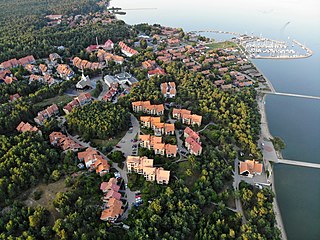
Nida is a resort town in Lithuania, the administrative centre of Neringa municipality. Located on the Curonian Spit between the Curonian Lagoon and the Baltic Sea, it is the westernmost point of Lithuania and the Baltic states, close to the border with the Russian Kaliningrad Oblast exclave. It currently has about 2,385 residents.

Lithuania Minor, or Prussian Lithuania, is a historical ethnographic region of Prussia, where Prussian Lithuanians lived, now located in Lithuania and the Kaliningrad Oblast of Russia. Lithuania Minor encompassed the northeastern part of the region and got its name from the territory's substantial Lithuanian-speaking population. Prior to the invasion of the Teutonic Knights in the 13th century, the main part of the territory later known as Lithuania Minor was inhabited by the tribes of Skalvians and Nadruvians. The land depopulated during the incessant war between Lithuania and the Teutonic Order. The war ended with the Treaty of Melno and the land was repopulated by Lithuanian newcomers, returning refugees, and the remaining indigenous Baltic peoples; the term Lithuania Minor appeared for the first time between 1517 and 1526.

Königsberg is the historic German and Prussian name of the medieval city that is now Kaliningrad, Russia. The city was founded in 1255 on the site of the small Old Prussian settlement Twangste by the Teutonic Knights during the Baltic Crusades. It was named in honour of King Ottokar II of Bohemia, who led a campaign against the pagan Old Prussians, a Baltic tribe.
The Yantar Special Economic Zone is a Special Economic Zone in Russia that was established in 1996 in the Kaliningrad Oblast of the Russian Federation.

Yasnaya Polyana is a rural settlement (posyolok) in the Nesterovsky District of Kaliningrad Oblast, Russia. It is located in the southeast of the oblast, north of the Romincka Forest. Nearby Diwnoje Nowoje is a railway station on the former Prussian Eastern Railway from Kaliningrad to Kybartai in Lithuania.

The Curonian Lagoon is a freshwater lagoon separated from the Baltic Sea by the Curonian Spit. Its surface area is 1,619 square kilometers (625 sq mi). The Neman River supplies about 90% of its inflows; its watershed consists of about 100,450 square kilometres in Lithuania and Russia's Kaliningrad Oblast.

The Amber Coast is the name given to a coastal strip of the Baltic Sea in the northwest of Kaliningrad. In this area amber has been excavated since the mid-19th century and up to today in open-pit mining. Two deposits – Palmnikenskoe and Primorskoe, containing 80% of world amber reserves, were found near Yantarny on the Western coast of the Sambia Peninsula in 1948-1951’s.
Russian Prussia refers to two periods in the history of Prussia. Since 1991 Russian Prussia has been a synonym for Kaliningrad Oblast.
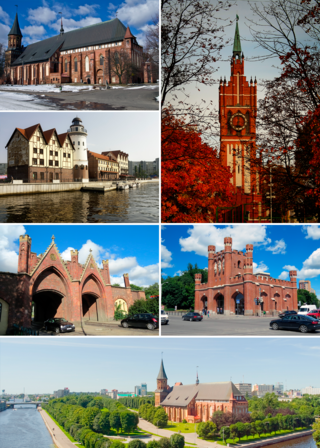
Kaliningrad, until 1946 known as Königsberg, is the largest city and administrative centre of Kaliningrad Oblast, a Russian exclave between Lithuania and Poland. The city sits about 663 kilometres (412 mi) west from mainland Russia. The city is situated on the Pregolya River, at the head of the Vistula Lagoon on the Baltic Sea, and is the only ice-free port of Russia on the Baltic Sea. Its population in 2020 was 489,359, with up to 800,000 residents in the urban agglomeration. Kaliningrad is the second-largest city in the Northwestern Federal District, after Saint Petersburg, the third-largest city in the Baltic region, and the seventh-largest city on the Baltic Sea.
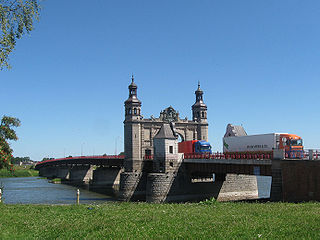
The Lithuania–Russia border is an international border between the Republic of Lithuania and Kaliningrad Oblast, an exclave of the Russian Federation. It is an external border of the European Union. The 274.9 km (170.8 mi) long border passes through the Curonian Spit and Curonian Lagoon, and then follows along the Neman River, Šešupė, Širvinta, Liepona, and Lake Vištytis. The sea border is another 22.2 km (13.8 mi). There is a tripoint between Lithuania, Russia, and Poland with a stone monument at 54°21′48″N22°47′31″E.

The Suwałki Gap, also known as the Suwałki corridor ( ), is a sparsely populated area around the border between Lithuania and Poland, and centres on the shortest path between Belarus and the Russian exclave of Kaliningrad Oblast on the Polish side of the border. Named after the Polish town of Suwałki, this choke point has become of great strategic and military importance since Poland and the Baltic states joined the North Atlantic Treaty Organization (NATO).





















